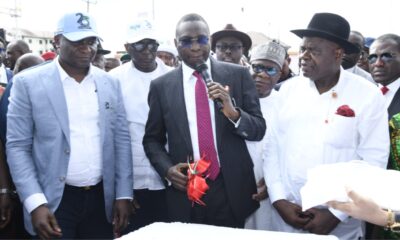Business
Transporter Accuses NRC Of Habouring Touts
The Nigerian Railway Corporation (NRC) Port Harcourt, has been accused of harbouring touts in its premises, who engage in molesting innocent drivers and transporters on daily basis.
President of the Rivers Transport and Investment Cooperation Union Limited (RTICUL), Mr. Tubonimi Wokoma who alleged that railway has partnered with illegality, also expressed trauma that transporters go through on the operations of these group of people.Wokoma explained that these group of persons have not properly identified whom they are working for, as they demand for both the Ministry of Transport (MOT) registration and colour, the Rivers State Environmental Sanitation sticker, as well as the Local Government Council stickers.
He alleged that it has become so clear that any vehicle impounded by these agents hardly go without parting with reasonable sum of at least N10,000, because as he puts it, “these boys must demand for any of the above stickers”, for which they claim that transporters must have on their vehicles.
The most annoying aspect of their operation according to the cooperative transport boss is that they do not even show sympathy for the suffering of their victims, as they would always say, “have you not heard about us in this Port Harcourt. Even governor knows that we are here, and nothing will happen”.
However, when The Tide called on the Railway station manager in Port Harcourt, Mr. Biodun Daniels for clarifications, he said that he is aware that such activities are going on at the railway premises.
Biodun explained that he met the group when he resumed office in Port Harcourt, when they were operating motorcycle (okada) business, and that they are from the Ministry of Transport and are operating legally, because the police and the Ministry of Transport made the arrangement for them.
When also contacted for comments, one of the officials of the taskforce operators who refused to disclose his identity said that they are representing the Port Harcourt City Council (PHALGA), and that because of space that was why they came to railway premises.
According to him, they do not demand for MOT and Sanitation, but that they impound vehicles that do not have daily council ticket and annual stickers and that they do not molest innocent drivers.
Business
NPA Assures On Staff Welfare
Business
ANLCA Chieftain Emerges FELCBA’s VP
Business
NSC, Police Boost Partnership On Port Enforcement
-
Sports5 days ago
Spanish Football Fires Entire Refereeing Committee
-

 Features5 days ago
Features5 days agoBetween EFCC And NDDC: Strategic Alliance For Niger Delta
-

 News5 days ago
News5 days agoCourt Sentences Gospel Singer To Death For Killing Girlfriend In Nasarawa
-

 Politics5 days ago
Politics5 days agoMakinde Renames Polytechnic After Late Ex-Gov
-
Sports5 days ago
Olympic Day Sparks Nationwide Fitness Fever
-

 Nation5 days ago
Nation5 days agoOgoni Stakeholders Hail Zabbey’s Performance
-
Sports5 days ago
I Joined Saudi League To Win Titles – Senegal Keeper
-

 Niger Delta5 days ago
Niger Delta5 days agoOBALGA Sole Administrator Presents Brand New Fire Extinguishers To Council …Commiserates With Traders Over Rumuomasi Market Fire Incident …Commences Desilting Of Drainages

